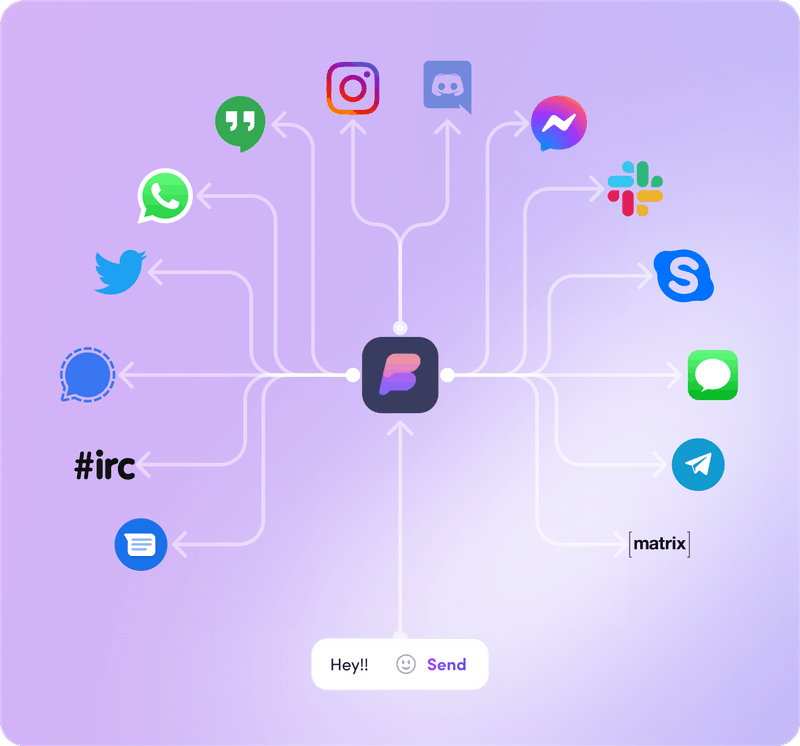I am impressed…
I thought I had a blog post about Beeper but I didn’t write one. So in short this picture sums up Beeper in one go.
Imagine if you could use one client to access all these different networks, but unlike pidgin or trillian which needs software plugins to connect to them all. Beeper is actually a Matrix client which connects to specific Matrix bridges (server based, instead of client based) to other messaging networks.
Its one of the thing which blew me away when I saw Matrix at Mozfest 2017.
Matrix is open source and you can run it on your own infrastructure (we will get back to that soon). You can even install your own bridges.
In short Beeper is the Matrix dream in a managed service which you pay $10 a month. You can self host it and its something I may do after a while but right now I’m happy to give some money to get use to things
First thing I did is install the appimage for Linux, set it up using the code I had received via email. Then setup a few networks. Within a few minutes I was replying to friends
I tested Slack using Storyteller United and was quite impressed, although I ended up disabling it due to the amount of channels and how busy the slack can be.
I may enable it again for a few slacks I am part of but don’t want the whole of slack on. Currently I have the Slack app on my laptop and work phone but I like the idea of the messaging parts without the heavy slack app.
I noticed you can input Gifs, emoji’s, attachments, etc in almost every single message in a unified way. I haven’t hooked up my SMS yet (mainly because there is no RCS bridge yet which I would miss). I also would like to see scheduling as I’m so use to it now.
Of course the phone interface for beeper is similar, Gif and all. You can use the unified inbox which puts everything in one timeline. The spaces cuts everything by network.
To be frank, Beeper is impressive and if I could change a few things they would be.the ability to have multiple accounts. For example I would love to be able to finally have one client for the multiple Signal accounts (I have one for my personal and work mobiles). This might be a limitation of Signal, but it would be great if I could spin up 2 bridges. I say this as I added 2 slack accounts and could add more with ease.
Right now Beeper is very much work in progress, but its got most of the key features. I don’t feel like I have fully added the networks yet as I hold on to apps like Android messages due to RCS and scheduled messages. I could add Twitter and Discord but I’m quite happy with my Mastodon clients and cross posting to Twitter. Although I might hook up my ianforrester account on twitter just to see what its like in beeper. I even consider setting up Telegram, i-message, etc accounts just because I can now without the stress.
I forgot, Beeper doesn’t replace the existing messaging systems, meaning when I finally hooked up Android messages, I can still send scheduled messages and RCS from the app. But reply and send general messages from Beeper.
The network diagram at the very top is actually slight wrong because Beeper sits within the Matrix network and once I understood this via the support channel. It became clear I could easily share things between all my mobiles and laptop with ease. Bit like how I use Signal’s personal space/notes to yourself. I haven’t tried connecting to any of the Matrix systems I’m part of like publicspaces, sdeps or redecentralise. But I’ll give it a try over the next few days.
I like Beeper, but do long to setup my own bridges in a docker container or rasberrypi in the near future. Is 10$ a month quite a bit expensive for this? Maybe but only because I am still getting use to it and not fully using it. I think if I was using it for everything, 10$ a month would great value. Its a good business model, as most won’t or can’t run their own bridge server. (I have already looked to see if Yuno host has support or not)
I look forward to the regular updates and seeing it mature into something unique.
Funny enough I heard Beeper on Twit.TV’s all about android too. The person who wrote in didn’t blur any of his conversations and contacts which I would say is super brave or not thinking things fully through? However its interesting to see someone else also using Beeper and the reaction to it from people not fully aware of










